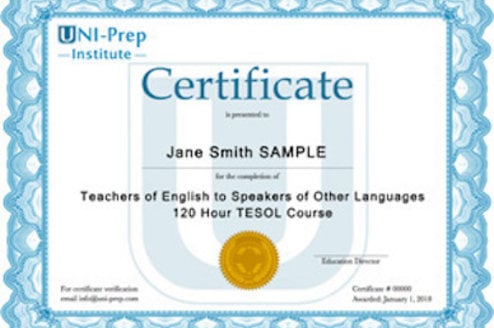Guide to TEFL Certifications & Courses
Teaching English abroad is a great way to travel, gain work experience, and leave a positive impact on local
communities. However, the market for ESL teaching jobs is competitive, which is why getting TEFL certified can
give you a major advantage over other candidates!
TEFL (Teaching English as a Foreign Language) certification is an internationally-recognized credential
designed to train teachers to confidently teach English to non-native speakers, helping you become a more
prepared teacher abroad.
How to Choose a TEFL Program
Choosing the right TEFL course is essential. As you research and compare TEFL programs, make sure it matches
the following criteria:
-
Accredited and recognized:
To prove your certification is accredited, make sure your TEFL certificate is approved by independent bodies
like ALTE, English Profile, QuiTE, British Council, NCFE, ACCET, IATEFL, ODLQC, ACTDEC, or affiliated with a
recognizable university.
-
Meets international standards:
120 hours is the golden number for a TEFL course! The industry standard includes 100 hours of training, plus
20 hours of teaching practice, although 6 is the minimum
-
Offers live teaching practice:
Your course must incorporate at least 6-20 hours of live teaching practice. Many online TEFL courses also
incorporate live teaching practice in their practicum!
-
Qualified instructors:
Trusted courses are taught by a university-level instructor, with experience in teaching English and training
teachers.
-
Strong level of support:
Job placement assistance, referrals to recruiters and top schools, and even interview help can go a long way!
Our database of online, in-class, and accredited TEFL certification programs will help you gain the teaching
credentials you need.
Should you get certified online or in-person?
Choosing between an online and in-person TEFL course depends on your goals and lifestyle.
Online courses are flexible and budget-friendly, allowing you to learn wherever and at your own pace. Since
lectures are recorded, you can fit your studies around other commitments like work or school. However, they may
not be as immersive as an in-person course, especially if you’re aiming to teach in a specific country.
If you want the best of both worlds, consider a hybrid TEFL course, which combines online lessons with in-person
teaching practice for a more rounded experience.
Benefits of TEFL Certification
On the fence about getting TEFL certified? Think of it as a pre-requisite or your golden ticket to teaching
abroad. Here’s why you should consider getting TEFL certified:
-
Teaches you valuable skills to help you with classroom management, lesson planning, proficiency testing, and
phonetics
- Introduces you to friends and fellow teachers who will share the same career journey with you
- Increases job security and can help you receive higher pay
- Offer you extended support during the job search
-
Some countries require it! To teach in popular ESL countries like South Korea and Thailand, you’ll need to
show proof of a TEFL certificate.
Types of TEFL Certifications
There are three main types of teaching certifications: TEFL,
TESOL, and
CELTA. Though they’re all slightly different
in terms of length, coursework, and cost, they all focus on training English speakers to teach English in a
classroom setting.
Here’s the difference between the three:
- TEFL (Teaching English as a Foreign Language): Provides you with the skills to teach English in non-English speaking countries.
-
TESOL
(Teaching English to Speakers of Other Languages):
Allows you to teach English to students who live in English-speaking countries, but English isn’t their first
language.
-
CELTA
(Certificate in English Language Teaching to Adults):
Designed by Cambridge University, CELTA is a
type of TEFL certification that will train
you to teach English around the world. It’s a more intensive course than your typical TEFL program and is
considered the most prestigious qualification for teaching abroad.
Average Cost of a TEFL Course
The costs of TEFL certification courses can
vary, depending on the provider and course length. Some programs even offer the opportunity for you to earn your
TEFL while teaching abroad.
The average price of an in-person TEFL program is $1,500-$2,000 through a reputable program or university.
However, you may need to factor other expenses such as airfare, housing, visa, and daily transportation.
Many accredited, high quality virtual TEFL courses range between $300-$600.
Be careful of TEFL programs that advertise themselves as cheap – they could be a scam. Always ensure that the
program you’re purchasing is accredited, meets at least the 120-hour minimum, and offers live teaching practice.
How to use Go Overseas
Go Overseas is your go-to source for trusted travel programs. Explore thousands of vetted options and get the guidance you need to feel confident and excited about culturally-immersive experiences abroad.
Here’s how to use GO to plan your next adventure:
- Explore 16,000+ programs: Narrow your search results by using filters, such as program type, location, and length.
- Compare 46,000+ reviews: Real people have gone on these programs, and have unique experiences to share. Read their reviews to learn what it’s truly like to live and learn abroad!
- Read alumni interviews: Hear personal stories and in-depth accounts from fellow travelers just like you!
- Browse community photos: Dive into photos of real experiences from our community of travelers. From mouthwatering meals and cozy accommodations, to breathtaking adventures and new friends, our galleries bring the journey to life. Start picturing your story abroad!
- Wish List 💙: Not ready to commit to a program? Click the Wish List heart icon to bookmark programs and save them for later. Then, compare programs side by side.
































